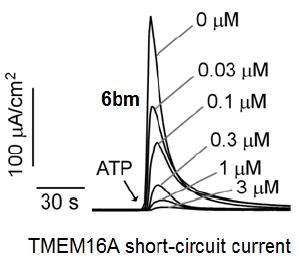Potent TMEM16A Small Molecule Treatment for Inflammatory and Reactive Airway Diseases, Asthma, Hypertension, Pain and Cancer
Invention Novelty
A novel class of 2-acylamino-cycloalkylthiophene-3-carboxylic acid arylamides (AACTs) as potent TMEM16A inhibitors
Value Proposition
Transmembrane protein 16A (TMEM16A), also called anoctamin 1 (ANO1), is a Ca2+-activated Cl- channel expressed widely in mammalian epithelia, vascular smooth muscle and electrically excitable cells. Increased TMEM16A expression is associated with COPD and asthma, and TMEM16A is reported as a biomarker for gastrointestinal stromal and esophageal tumors. Pharmacological TMEM16A inhibitors, including the AACT small molecule scaffolds described in this invention, could be used to treat diseases such as inflammatory and reactive airway diseases, hypertension, gastrointestinal hypermotility and some cancers.
The TMEM16A inhibitors developed by UCSF scientists have the following advantages:
- IC50 ~ 30 nM; substantially more potent than prior compounds
- Substantially better metabolic stability and PK than prior compounds
- Demonstrated efficacy in acute hypertension, inhibition of intestinal smooth muscle contraction and inhibition of GI tumor cell growth

Technology Description
The Verkman lab at the University of California, San Francisco has discovered, synthesized and biochemically evaluated of a series of TMEM16A inhibitors. The chemical structure of the 2-acylamino-cycloalkylthiophene-3-carboxylic acid arylamide inhibitor scaffold was refined through medicinal chemistry to identify bromodifluoroacetamide-based inhibitors with enhanced potency and metabolic stability.
Looking for Partners
To develop & commercialize the TMEM16A inhibitors as therapies for inflammatory and reactive airway diseases, hypertension, gastrointestinal hypermotility and some cancers.
Stage of Development
Proof of Concept – in vitro and ex vivo
Data Availability
Under NCD/CDA
Related Materials
Patent Status
| Country | Type | Number | Dated | Case |
| United States Of America | Issued Patent | 11,358,947 | 06/14/2022 | 2017-138 |
Contact
- Todd M. Pazdera
- todd.pazdera@ucsf.edu
- tel: View Phone Number.
Inventors
- Anderson, Marc O.
- Phuan, Puay-Wah
- Verkman, Alan S.
Other Information
Keywords
Thiophene-arylamides, AACT, TMEM16A inhibitors, Ca2+-activated Cl- channel inhibitors
Additional Technologies by these Inventors
- SALT-SPARING UREA TRANSPORT INHIBITOR DIURETICS FOR TREATMENT OF CARDIOVASCULAR AND RENAL DISORDERS
- Novel Small Molecule Drug for the Treatment of Constipation and Oxalate Kidney Stones
- Small Molecule Pendrin Inhibitors for Treatment of Inflammatory Airway Diseases and Diuretic Resistance
- Immunotherapy for Treatment of Neuromyelitis Optica (NMO)
